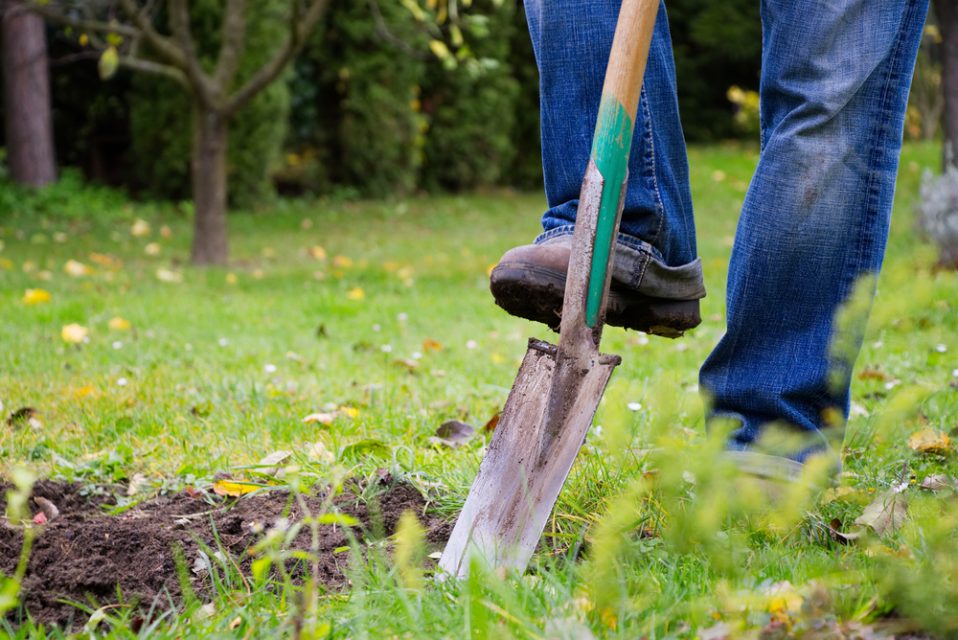Every nine minutes, an underground utility is damaged because someone didn’t call 811.
This statistic is from the Common Ground Alliance (CGA), and if this number sounds alarmingly frequent to you, it is because many are unaware that they need to call 811 before they dig.
April is National Safe Digging Month and while the ground may not even be thawed where you’re located, it’s still a good reminder to know what you need to do before breaking ground on this year’s projects.
There are more than 100 billion feet of underground utilities in the United States, according to data compiled by CGA from various industry groups, so you can’t assume your customer’s property doesn’t have any.
There is no allotted depth before a person needs to call 811. Whether you are just planting small shrubs or installing fences, CGA says any time you are putting a shovel in the ground you need to call due to the fact that many utilities are buried just a few inches below the surface.
Even if a spot has been previously marked, erosion and root system growth can alter the depth or location of buried lines, so it is important to call each time you start a project.
Calling 811 isn’t an optional task either, as every state has a variation of the law requiring individuals to call before digging. While the time period to call 811 before digging varies, you can check out your various state’s guidelines here.
It is a common misconception that calling 811 costs money, but calling is free. The cost is paid by utility companies to protect you, your crews and your customers. The real costs affect your business when you don’t call, hit a utility line and are held responsible for the damage.
Some utility companies charge not only for the cost of sending a crew out to repair or replace the damaged property but also for the loss of service that comes from the lines being out of commission.
Other states have introduced penalties and fines in recent years to help enforce the law. In 2016, Mississippi passed a law that required first time offenders to complete a training course on compliance.
Second time offenders in a five-year period require a training course or a fine of up to $500 per incident. Third time offenses in a five-year period result in up to $2,500 per incident, and malicious acts with intent to damage underground lines result in a training course and fines up to $5,000 per incident.
Below is how the 811 process works and what you can expect:
- Notify your local one-call center by dialing 811 or making an online request two to three days before digging.
- The one-call center will notify the affected utility companies. Wait two to three days (this varies by state) for the utility operators to respond to your request. An average of seven to eight operators are notified for each request.
- Confirm that all the affected operators have responded to your request. State laws vary on the process for confirmation.
- Dig carefully around the marked areas. The majority of state laws prohibit the use of machines within 18 to 24 inches of a marked utility. If there is a need to dig nearer, hand dig or use vacuum excavation.
Keep in mind that the locate ticket is only valid for a certain period of time depending on the state, and if you wish to continue you must call 811 again for a re-mark.
If one of your employees does end up hitting a pipeline, stop work immediately. Depending on the type of utility line hit, the following steps vary.
For natural gas, propane or petroleum lines, evacuate the site, call 911 and the facility operator. Don’t do anything that could cause a spark and alert everyone of the premises. Rope off the area and keep the public away. Stay up wind from the gas and do not try to fix the pipe yourself.
For electrical lines, warn everyone in the area, including emergency response personnel, that the ground and objects near the point of contact may be energized.
Contact the electrical utility operator or fire department if a radio or phone is at hand. Otherwise, remain on the excavator and signal for someone to call for utility and emergency assistance.
Those near the excavator or point of contact should remain still with both feet together. They should not touch the excavator or material. Only leave the excavator and area after an official of the electric utility has said it is safe to do so. If immediate evacuation is needed due to the threat of fire, explosion or other hazard, jump (don’t step) from the equipment and land with both feet. Hop at least 25 to 30 feet away. Do not take normal, walking steps.
For damaged telecommunication lines, notify the facility owner and do not examine or stare at broken, severed, disconnected fibers. Move a safe distance away and keep the area barricaded to keep others away.
After assessing the situation and seeing that nothing appears damaged, still contact the pipeline operator. Minor nicks or dents could cause serious problems in the future.
If a homeowner has consulted you but plans on going the DIY route, stress to them that 811 isn’t just required for professionals; everyone who plans to dig needs to call this number.
The article was originally seen at https://www.totallandscapecare.com/business-best-practices/before-you-shove-in-a-shovel-call-811-to-avoid-trouble/







Post a comment